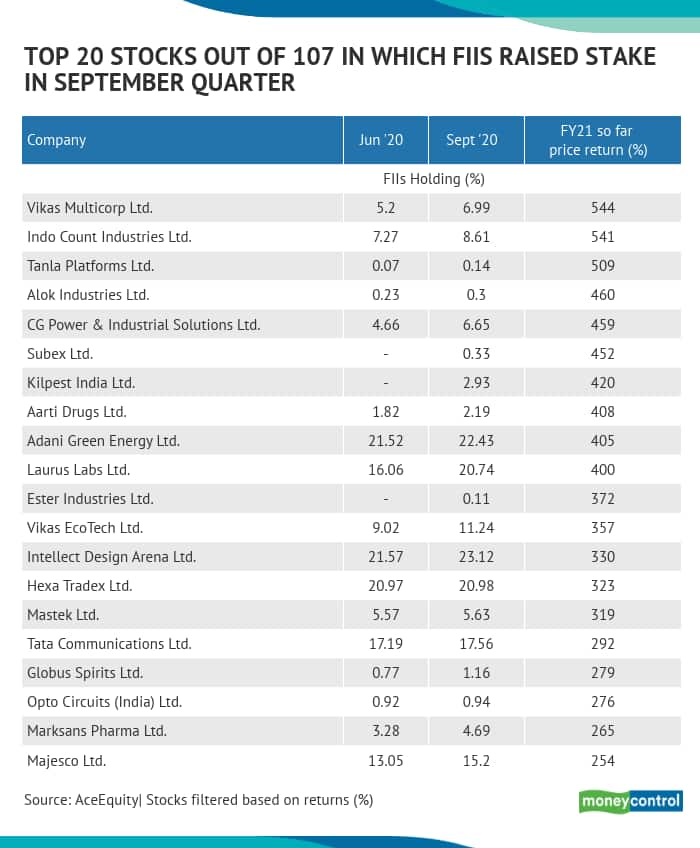



Foreign institutional investors (FIIs), who were net buyers of more than Rs 3,5000 crore in the cash segment of the Indian equity markets, raised stake in nearly 400 companies in the September quarter. 100 of them more than doubled wealth since March-end when the market hit a recent low.
There are as many as 385 companies in which FIIs raised stake in the September quarter and stock price of 107 of those companies rose 100-500% from March-end to date.
Stocks that more than doubled investor wealth include M&M, Emami, Best Agrolife, Prakash Industries, Jindal Poly, Adani Gas, Glenmark Pharma, Adani Gas, Jindal Stainless, Affle India and Dixon Technologies.
Most stocks that have done well are from the small & midcap space. The rally in the broader market is partly related to the 2-years of underperformance in the segment, and also due to the fact that many stocks with quality management and strong business model are ripe for long-term wealth creation.
Foreign institutional investors (FIIs) are chasing growth and the theme which was largely underexplored was the broader market space which has tremendous potential to outperform largecaps in the next 1 year.
“Irrespective of stock returns, FII holding has increased substantially in reputed, quality-oriented and growth-seeking stocks. Small and midcaps have been out of favor since January 2018 and have underperformed large cap stocks in general,” Gopal Kavalireddi, Head of Research at FYERS told Moneycontrol.
“With growth slowing down among many large companies, investors – domestic and international – are seeking next-in-line companies which are exhibiting the potential to move from mid to large or small to a midcap category,” he said.
The stock market crash of March 2020 provided the perfect opportunity to all types of investors. When evaluated on the basis of business potential, quality of management, financial strength, a good number of small-cap companies are ready to move to the next level of growth.

Kavalireddi further added that many support schemes extended by the government as part of Made in India, Atmanirbhar Bharat, Production Linked Incentive (PLI), MSME loan package etc. are giving a new lease of life, through newer opportunities for higher growth.
Benchmark indices have seen a steady rise since March-end. Both Sensex and Nifty50 have rallied by more than 30 percent each while the gains in the Mid & Smallcap indices have been much bigger.
Not all mid & small-cap stocks have been winners in the recent rally. There are about 50 stocks (small & midcap combined) which have given negative returns since March-end.
FIIs which have been net buyers in Indian equity markets since March are chasing quality stocks that can deliver growth and has quality management who has the will and the vision to execute future projects amid the outbreak of COVID-19.
“The mid-cap and small caps space has seen rallies in the last couple of quarters. This is normally a scenario specifically post any big shock like COVID-19,” Vishal Wagh, Research Head of Bonanza Portfolio told Moneycontrol.
“Money is chasing the stocks which have the potential to survive in these critical scenarios and opportunities to grow too. So, one can say the FIIs are chasing growth,” he said.
Gaurav Garg, Head of Research at CapitalVia Global Research Limited said that FIIs have increased their exposure in quality small & midcap stocks, and I do agree FIIs have turned bullish in growth-oriented stocks, amidst volatile market sentiments.
“Bandhan Bank, Amber Enterprises India ltd, Balkrishna Industries, Lauras Labs, and other high beta stocks might see a turnaround. However, investors should have limited exposure in these stocks,” he said.
What should investors do?
FIIs time horizon, asset allocation as well as risk-taking ability could be very different from individual portfolios. Hence, before making a buy or sell decision, investors should carefully study each and every stock.
Therefore there are some other factors that one must keep in mind apart from FII activity before taking a buy or sell decision. Palka Chopra, Senior Vice President Master Capital Services highlights 6 such factors:
Earnings Growth
Check the net increase in income and sales that a company has over time. Look for the trends in the past few years. Even if there is not much increase, a company that has steady and consistent earnings growth over time can be a good bet for the future.
• Stability
Every company is going to go through a time where the stock loses value. This is common, especially during times of economic difficulty and market disturbance. Instead, the investor should look for the overall stability as it relates to the economic conditions.
• Relative Strength in Industry
Compare the company with its Industry overall strength. Look at the company’s relative strength in the industry. Is it well placed against its competitors. Take into account the industry as a whole, and the company to be a part in it.
• Debt-to-Equity Ratio
Every company carry some debt on the balance sheet. Even the richest companies carry liabilities. However, you want to be cautious of companies with high amounts of debt. Everyone prefers a company that has more assets than liabilities. If you want an investment that is likely to present a lower risk, consider a company with a debt-to-equity ratio of 1.10 or below.
• Price-to-Earnings Ratio
P/E ratio is a measure of the stock’s value. It is used to consider how well the stock’s price is doing in relation to its earnings. When it comes to fundamental analysis, and value investing, the P/E ratio is often considered one of the most important considerations.
• Management:
How well is the company managed by its management? Do you feel that those in charge are competent? Consider the general culture. Look at how innovative is the company. Also, consider whether any scandal could harm the company or not.
Disclaimer: The views and investment tips expressed by experts on Moneycontrol.com are their own and not those of the website or its management. Moneycontrol.com advises users to check with certified experts before taking any investment decisions.
Discover the latest Business News, Sensex, and Nifty updates. Obtain Personal Finance insights, tax queries, and expert opinions on Moneycontrol or download the Moneycontrol App to stay updated!